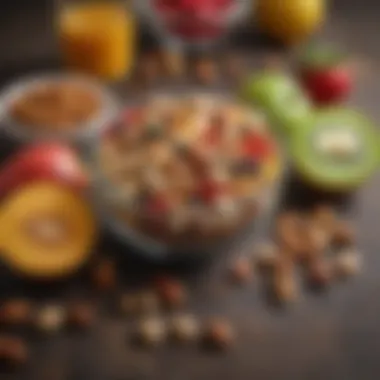Whole Food Plant-Based Snacks: Comprehensive Guide


Intro
In recent years, the rise of health consciousness has led many individuals to reconsider their dietary habits. With the growing awareness of the benefits of whole food plant-based diets, snacking has also undergone a transformation. Whole food plant-based snacks are not only nutritious but they also align with the principles of eating clean and minimizing processed foods.
Understanding the essence of whole food snacks requires more than just knowing what they are. It's about grasping their potential to positively influence health, provide energy, and satisfy cravings without compromising well-being. These snacks are made primarily from unprocessed plant foods like fruits, vegetables, nuts, seeds, and whole grains. They embody the idea that food can be both delicious and nourishing.
This guide dives into the world of whole food plant-based snacks. Here, we break down the myriad options available, discuss their health benefits, and offer practical tips on including these snacks in daily life. We aim to empower readers with knowledge that enables informed choices which can lead to enhanced health and vitality.
By shifting focus from quick, processed options to wholesome, nutrient-dense snacks, individuals can navigate their dietary choices more mindfully. Let's explore the various aspects of whole food plant-based snacks, starting with some key takeaways that will lay the foundation for our journey.
Intro to Whole Food Plant-Based Snacks
When it comes to snacking, the choices we make can shape our overall health and wellbeing, often more than we might realize. Whole food plant-based snacks not only provide a delightful treat but serve as small powerhouses of nutrition. Emphasizing real, whole ingredients rather than processed alternatives, these snacks encourage us to reconnect with what we eat. For individuals exploring healthier lifestyles, understanding these snacks is crucial, as they blend convenience, flavor, and the benefits of a balanced diet.
Why Whole Food Plant-Based Snacks Matter
A whole food plant-based approach to snacking focuses on ingredients that are as close to their natural state as possible. Imagine reaching for a handful of almonds instead of a sugary granola bar or snacking on a fresh apple rather than a processed cookie. It’s not simply about low-calorie choices; it’s about nourishing the body with essential vitamins, minerals, and antioxidants that come from vegetables, fruits, whole grains, nuts, and seeds.
The Importance of Choosing Wisely
With the daily hustle and bustle, it's easy to grab whatever is on hand. However, making conscious decisions about snack options can lead to significant benefits. Here are a few compelling reasons why it’s worth your while:
- Nutritional Density: Whole food snacks are rich in essential nutrients. Unlike heavily processed snacks that often lack in vitamins, these options help fill dietary gaps.
- Sustained Energy: Many whole food snacks provide a slow release of energy, keeping energy levels stable and hunger at bay.
- Flavor and Satisfaction: Without the overwhelming sweetness or artificial flavors found in many snacks, whole food options offer a satisfying crunch or zest that pleases the palate while still nourishing the body.
- Environmental Impact: Opting for plant-based snacks can contribute to sustainability since they often require less resource-intensive methods of production compared to animal products.
"Eating a wholesome diet not only benefits your health but also supports the planet."
Culmination
In this exploration of whole food plant-based snacks, we’ll journey through the nutritional advantages, the various types available, and how to seamlessly integrate these choices into a busy lifestyle. Getting acquainted with nourishing snacks allows not just for better health but also for a more mindful approach to eating that nurtures both body and mind.
Understanding Whole Food Plant-Based Diets
When we delve into the whole food plant-based lifestyle, it's crucial to grasp not just the surface level of what it entails but its implications and benefits. Understanding this diet transcends merely listing foods. It draws our attention to a holistic approach to nutrition and health. The emphasis here is on maximizing whole foods—unrefined and minimally processed—which ultimately nourish the body without stripping away essential nutrients. Not only does this lead to a healthier existence, but it opens the door to a multitude of vibrant flavors and textures.
Definition of Whole Food Plant-Based Diet
At its core, a whole food plant-based diet primarily consists of foods that come from plants. This includes not only fruits and vegetables but also nuts, seeds, whole grains, and legumes. It's about opting for foods in their natural state rather than those laden with additives and preservatives. While some might think this means limiting variety, it actually presents an opportunity to explore a broader spectrum of foods.
One may ask, "Is it only about avoiding meat and dairy?" The answer is that it involves making conscious choices to prioritize whole foods like oats, quinoa, and chickpeas while minimizing refined sugars, flours, and oils. This simplicity in focusing on whole ingredients can be quite liberating.
"Eating whole foods isn't just a trend; it's a path toward sustainability in our diets."
Core Principles of the Whole Food Approach
Grasping the core principles of the whole food approach can enhance one's understanding of this diet's purpose. Here are some of its foundational aspects:
- Minimally Processed: The aim is to consume foods close to their natural form. This means limiting processed snacks, sugary beverages, and other items burdened with artificial substances.
- Nutrient Density: Whole foods are typically more nutrient-dense, packed with vitamins, minerals, and antioxidants, which are essential for overall health. Think of every bite as an opportunity to fuel the body right.
- Variety is Key: Engaging with a wide array of fruits, vegetables, grains, and legumes not only prevents nutritional gaps but also keeps meals exciting. It’s an invitation to experiment with new recipes and flavors.
- Sustainability: Choosing whole food plant-based options encourages environmental sustainability. It supports practices that are kinder to our planet, promoting a cycle of healing for both body and Earth.
- Mindful Eating: This principle calls for attentiveness to what and how we eat. Recognizing the journey of our food from field to table can enhance appreciation and satisfaction.
By understanding and embracing these principles, individuals can journey into a healthier lifestyle. This way, the significance of whole food plant-based diets becomes evident—not only for personal wellness but also as a contribution to the greater good.
Nutritional Advantages of Whole Food Plant-Based Snacks
Understanding the nutritional advantages of whole food plant-based snacks is paramount, particularly in today's fast-paced lifestyle when quick food choices often lead to poor health decisions. These snacks not only provide immediate energy but also contribute significantly to long-term health benefits. By prioritizing whole foods that are plant-based, individuals are tapping into a rich reservoir of essential nutrients that can bolster their overall health. This section highlights various aspects of the nutritional benefits of these snacks, helping readers appreciate their value in both everyday snacking habits and long-term dietary strategies.
Rich in Essential Nutrients
Whole food plant-based snacks are, at their core, nutrient-dense. These snacks, such as raw almonds, fresh fruits, and homemade hummus, are brimming with vitamins, minerals, and antioxidants. They contribute to a diet that is rich in micronutrients while being relatively low in calories. For instance, a small serving of kale chips delivers an impressive dose of Vitamin K, C, and calcium, without loading the body with excess sugars or unhealthy fats.
- Vitamin Boost: Regular consumption of these snacks helps fill nutritional gaps that could lead to deficiencies.
- Antioxidant Rich: Fruits like blueberries and pomegranates are packed with antioxidants that fend off oxidative stress—a contributor to chronic illnesses.
- Fiber Frenzy: Foods like chickpeas or whole grain crackers offer fiber, aiding digestion and promoting satiety.
In choosing snacks that are rich in essential nutrients, one essentially chooses life-enhancing options, which can translate to improved energy levels, sharper mental acuity, and an overall improved sense of well-being.
Potential Benefits for Chronic Disease Prevention
The significance of whole food plant-based snacks extends into the realm of chronic disease prevention. Research has shown that diets high in plant foods are associated with a reduced risk of heart disease, diabetes, and certain cancers. These snacks provide potent health benefits because they contain naturally occurring compounds that promote health:
- Phytonutrients: These plant-derived compounds have anti-inflammatory and antioxidant properties. For example, flavonoids found in apples or citrus fruits can lower inflammation markers, which are crucial for chronic disease management.
- Healthy Fats: Snacks like avocado or walnuts are not just tasty; they're packed with heart-healthy fats that lower cholesterol levels and improve cardiovascular health.
- Glycemic Control: Whole food options tend to have a lower glycemic index, which helps manage blood sugar levels, reducing the risk of Type 2 diabetes.


Adopting whole food plant-based snacks can create a protective barrier against various chronic conditions, shifting the odds in favor of better health.
Contribution to Sustainable Health
Whole food plant-based snacks are not only good for the individual; they also align well with sustainable health practices. By choosing snacks that are plant-based, individuals can positively impact not only their health but also the environment:
- Low Carbon Footprint: Plant-based foods generally require fewer resources to produce compared to meat and dairy. By snacking on legumes or grains, you lessen environmental strain.
- Supporting Local Economies: Opting for seasonal fruits and vegetables, or local nuts and seeds, helps promote sustainable agricultural practices, benefiting the community at large.
- Eco-Friendly Choices: Snack options that are minimally processed tend to generate less waste and lower energy consumption through their production.
The act of snacking can become a powerful holistic practice that not only nurtures the individual but also contributes to the greater good. It’s a step towards not just personal wellness but also global sustainability.
Varieties of Whole Food Plant-Based Snacks
When it comes to whole food plant-based snacks, the options are as diverse as a rainbow in the sky. This variety is not just a feast for the eyes; it also plays a crucial role in keeping our taste buds stimulated and our nutritional intake balanced. Snacks that encompass different varieties can cater to a multitude of dietary preferences and health goals. By exploring these options, one can find flavors and textures that not only satisfy cravings but also contribute to overall well-being.
Savory Snack Options
Savory snacks can be a delightful way to curb hunger without the added sugar that often plagues regular snack foods. One might consider roasted chickpeas or spiced nuts as alternatives. These options pack a mean punch of flavor and nutrient density. Try mixing your own trail mix with pumpkin seeds, sun-dried tomatoes, or even olives, which bring a touch of Mediterranean flavor to your snacking routine.
Furthermore, veggie chips made from kale or sweet potatoes can offer that satisfying crunch. They are not only pleasing to the palate but also boast health benefits. You can easily make these at home without deep frying them, keeping oil use to a minimum. The key here is seasoning them with herbs like rosemary or garlic to enhance their flavor without extra calories.
Sweet Snack Options
Sweet snacks can be real game-changers, especially when aiming to satisfy a sweet tooth while sticking to whole food principles. One option is energy balls made from dates, oats, and a sprinkle of cocoa powder. They’re simple, and you can customize them with nuts or seeds of your choice.
Another great option is homemade fruit leathers. Just puree your favorite fruits and dehydrate them for a chewy, sweet snack that’s free from preservatives. These snacks not only deliver natural sweetness but also come packed with vitamins and minerals, keeping you energetic throughout your day. That’s a win-win, right?
Protein-Packed Choices
For those looking to bulk up their snacking with some extra protein, consider options like edamame or hummus paired with raw vegetables. Hummus, made from chickpeas, is not only fulfilling but is also versatile. You can jazz it up by adding spices or varying the base with ingredients like beetroot or avocado. It's colorful and delicious!
If you enjoy nuts, reaching for a handful of almonds or walnuts can provide not only protein but also healthy fats. Greek yogurt with fresh fruit can also serve as a protein-rich sweet treat, just ensure to select unsweetened versions to keep it on the healthier side.
Customizable Snack Ideas
Customization is where the fun lies! The beauty of snacks lies in their versatility. You can transform plain overnight oats by layering them with fruits, nuts, or even nut butter for an elevated, nutrient-dense bite. Creating snack jars can be entertaining and delightful. Stack ingredients like chia seeds, blended fruits, and a sprinkle of granola, and let the flavors meld together.
Another option is to create your own granola bars tailored to your liking. By choosing your preferred grains, dried fruits, and nuts, you not only control the ingredients but also the sweetness levels. These customizable options provide room for creativity, ultimately leading to a satisfying and enjoyable snacking experience.
"A well-chosen snack can bridge the gap between meals and elevate your mood, all while keeping your nutritional goals in focus."
The journey through the varieties of whole food plant-based snacks is about exploring flavors and reaping dietary rewards. By incorporating a mix of savories, sweets, protein-packed choices, and customizable snacks, you create a wholesome palette that not only aligns with health goals but also keeps your palate happy.
How to Select Nutrient-Dense Snacks
Selecting the right snacks is, without a doubt, a crucial piece of the broader puzzle when we talk about nutrition and overall well-being. Navigating the snack aisle can sometimes feel like wandering through a maze, especially with so many options bearing enticing labels and colorful packaging. However, understanding how to spot nutritious choices aligns not only with your health goals but also with the larger principles of a whole food plant-based diet.
Reading Labels: What to Look For
When it comes to choosing whole food plant-based snacks, knowing how to decipher food labels is critical. Nutrition labels can feel overwhelming, but focusing on a few key elements can simplify the process.
- Ingredient List: Prioritize snacks with short ingredient lists. The fewer the ingredients, the better, as this typically indicates less processing. Look for snacks that primarily contain whole foods like nuts, seeds, fruits, and vegetables.
- Serving Size: Pay close attention to the serving size stated on the label. Often, a small portion might lead you to underestimate how much you’re actually consuming.
- Nutritional Content: Look for snacks that are low in added sugars and saturated fats. Aim for higher dietary fiber and protein content to keep you satiated longer.
Once you get the hang of these basics, picking nutrient-dense snacks becomes much easier and even a bit more fun.
Identifying Hidden Ingredients
Not all ingredients are created equal. In fact, some of the sneakiest additives can be lurking behind familiar names that you might think are healthy. Knowing how to identify these hidden ingredients is your first line of defense against processed snacks.
- Preservatives and Additives: Words like BHT, sodium nitrite, or monosodium glutamate often hint at a product that, while tasty, may not support your health journey.
- Added Sugars: Be wary of ingredients ending in -ose, like fructose or glucose, as these are simply forms of sugar. They're often present in seemingly healthy snacks and can quickly undermine your goals.
- Synthetic Ingredients: Ingredients that sound more like a chemistry project than food should raise a red flag. If you can't pronounce it, perhaps it's better left on the shelf.
This process can be time-consuming but identifying hidden ingredients can significantly uplift your snacking habits.
Choosing Whole Ingredients Over Processed Ones
In a world where convenience often reigns supreme, it’s tempting to opt for processed snacks that offer ease and speed. However, reverting back to whole ingredients can profoundly impact your health.
- Whole Grains: When selecting grain-based snacks, look for options that specify whole grains. These carry more fiber and nutrients compared to their refined counterparts.
- Fresh Produce: Nothing beats fresh fruits and vegetables as snacks—think sliced apples with almond butter or cucumbers with hummus.
- Legumes and Nuts: Ensure packaged legumes and nuts are minimally processed. Choose varieties without added oils or sugars to maximize the nutrition.


Choosing whole over processed not only enhances your nutrient intake but also often means fewer calories and additives. Making this choice is about investing in your health.
"The best snacks are those that showcase whole, vibrant ingredients, connecting us to the food in its purest form."
In summary, a mindful approach in selecting snacks will not only satisfy your cravings but also support your health goals profoundly. Prioritizing quality over quantity and becoming adept at reading labels can lay a solid foundation for healthier snacking habits.
Crafting Your Own Whole Food Plant-Based Snacks
Creating your own snacks in the realm of whole food plant-based eating is a game changer. It allows you to take control over not just what goes into your body but also how your food gets made. Plus, the satisfaction that comes from whipping something up in your own kitchen is hard to beat. This section dives into the essentials that make crafting your snacks both enjoyable and beneficial.
For health professionals, wellness coaches, and nutritionists, presenting your clients with DIY snack options means offering them tools to enhance their dietary choices. It makes food preparation accessible and encourages a hands-on approach to nutrition. With an emphasis on whole ingredients, crafting your own snacks empowers individuals to make mindful decisions, supporting their health journey.
Simple Recipes for Quick Snacks
When the snack attack comes knocking, having quick and easy ideas at your fingertips is critical. Here are a few simple recipes that require minimal prep and deliver on nutrition:
- Spiced Chickpeas: Toss canned chickpeas with olive oil, paprika, garlic powder, and a pinch of salt. Roast them in the oven at 400°F for 25-30 minutes until crispy. They’re crunchy and satisfying, with a solid protein punch.
- Nutty Energy Bites: Mix rolled oats, almond butter, honey, and dark chocolate chips in a bowl. Roll them into balls and refrigerate for a quick on-the-go energy boost.
- Avocado Rice Cakes: Smash ripe avocado on a whole grain rice cake, sprinkle with sea salt, and add a squeeze of lemon. It's crunchy, creamy, and nutrient-dense.
Meal Prepping Snack Ideas
The key to successful snacking is preparation. When life’s busy, prepped snacks can keep you on track without unnecessary stress. Consider these ideas:
- Veggie Packs: Slice carrots, cucumbers, and bell peppers ahead of time. Place them in sealed containers with hummus for dipping. Perfect for a quick grab-and-go.
- Overnight Oats: Combine rolled oats, a plant-based milk, chia seeds, and your choice of fruits in a jar. Let it sit overnight and voilà! A hearty snack ready when you are.
- Frozen Granola Bars: Make a batch of homemade granola bars using oats, nut butter, and dried fruits. Cut them into bar shapes and freeze. This way, you’ll always have a nutritious snack within arm’s reach.
Utilizing Seasonal Ingredients
When it comes to enhancing the flavor and nutritional value of your snacks, seasonal ingredients can work wonders. Not only do they offer the best taste, but they can also be more affordable. Here are a few ideas:
- Spring: Fresh strawberries and rhubarb can make delightful snacks, whether it's a strawberry chia pudding or rhubarb compote served with whole grain toast.
- Summer: Think about cucumber slices topped with smashed beans or savory dips. Heirloom tomatoes can also work wonders with a sprinkle of salt and herbs.
- Autumn: Pumpkin seeds roasted with spices or baked apple slices with a dash of cinnamon can fill the gap when the weather starts to cool down.
- Winter: Root vegetables, like sweet potatoes or beets, can become crispy snacks when baked with your favorite seasonings.
Crafting your own snacks not only fosters creativity in the kitchen but also strengthens your connection to food, making each bite more meaningful.
By diving into crafting your own whole food plant-based snacks, you enrich your diet, save time and perhaps even save a few bucks down the line. Whether you’re a health professional guiding others or an individual wanting to take the reins on snacking, these insights can settle well into everyday life.
Integrating Whole Food Plant-Based Snacks in Daily Life
Integrating whole food plant-based snacks into daily life is not just a trend; it's a shift in perspective that plays a crucial role in maintaining a healthy lifestyle. With the hustle and bustle of modern living, it’s easy to let convenience overtake nutritional value, but when we deliberately choose nourishing snacks, we can significantly benefit our health, energy levels, and overall well-being.
This section will unpack how making these thoughtful choices can seamlessly fit into your busy schedule, while also being considerate of financial limitations. Embracing a routine that includes whole food plant-based snacks means prioritizing not just what you eat, but how and when you eat it, paving the way for a conscious approach to nutrition.
Incorporating Snacks into a Busy Lifestyle
Finding time to snack healthily during a hectic day can be a real challenge. Whether you're juggling work commitments, family, or personal obligations, it can feel like there's never enough time to prepare something nutritious. However, integrating whole food plant-based snacks into your routine doesn’t have to be complicated.
A practical approach is to prepare snacks in advance. Batch cooking and prepping ingredients can save you precious minutes each day. For instance, slicing fresh vegetables such as carrots, bell peppers, and cucumbers can offer quick grab-and-go options.
Here are some simple strategies to consider:
- Pack a snack bag: Fill it with nuts, seeds, or dried fruits for easy access throughout the day.
- Utilize leftovers: Leftover cooked quinoa or brown rice can be turned into quick patties or mixed with herbs for a savory snack.
- Make smoothies: Keep a stash of frozen fruits; whip up a smoothie for a refreshing, nutrient-packed snack that's ready in a flash.
Snacking on a Budget
Budget concerns often deter individuals from choosing healthier options. However, whole food plant-based snacks can be affordable and accessible. Planning is key. By shopping smart and making choices that don't break the bank, you can enjoy nutritious snacks without feelings of strain on your wallet.
Here are some cost-effective tips:
- Buy seasonal produce: Fruits and vegetables that are in season are typically cheaper and taste better.
- Opt for bulk items: Purchasing ingredients like oats, beans, or lentils in bulk can reduce overall costs.
- DIY snacks: Instead of buying pre-packaged snacks, try making your own. Energy balls made from oats and nut butter are simple and inexpensive to prepare.
Mindful Snacking Habits
Mindful snacking is another important aspect when integrating whole food plant-based options into your daily routine. It's all about being present and intentional with your food choices. Instead of simply munching on snacks out of habit, take the time to engage with your food.
Consider these practices:
- Focus on your senses: Pay attention to the colors, textures, and flavors of your snacks. This practice not only enhances your eating experience but may also help with portion control.
- Sit down when snacking: Whenever possible, sit down to enjoy your snacks rather than eating on the go. This encourages a more mindful approach and helps in savoring every bite.
- Limit distractions: Try to minimize distractions such as screens when snacking. This allows you to be more present with your food.
"Mindfulness in snacking contributes to better digestion and satisfaction, reducing the likelihood of overeating."


Incorporating these practices not only makes the act of snacking more enjoyable but might also positively impact your overall relationship with food.
By putting in a bit of effort to integrate these whole food plant-based snacks into daily life, you can nourish your body, save money, and develop a mindful relationship with eating. The journey might seem tough at first, but with some preparation and intention, it can become a rewarding part of your everyday routine.
Considerations for Dietary Restrictions
When delving into whole food plant-based snacks, it's imperative to recognize the varying dietary restrictions that individuals might encounter. Dietary restrictions can arise from allergies, intolerances, or lifestyle choices and can significantly influence snack choices. Understanding these specifics not only aids in making informed decisions but also ensures that one’s dietary journey remains inclusive and enjoyable. In this section, we’ll delve deeper into gluten-free options, nut-free alternatives, and low-sugar snacks, offering insights tailored to different health needs.
Gluten-Free Options
Gluten sensitivity and celiac disease affect a substantial portion of the population, making gluten-free options essential in a whole food plant-based framework. Fortunately, snacking without gluten doesn’t mean forgoing flavor or nutrition. Many whole foods naturally fit the bill. Consider snacks made from quinoa, brown rice, or chickpeas.
- Quinoa Crackers: Delectable options are popping up that are made entirely from quinoa. These little wonders are not only crunchy but substantial enough to hold up against dips.
- Vegetable Chips: Sweet potato, zucchini, and kale chips offer savory, crunchy alternatives to traditional potato chips, with the added benefit of vitamins and minerals.
- Fruit-Based Snacks: Dried fruits or fruit leathers can satisfy that sweet tooth without the gluten.
It’s crucial to look for labels stating "gluten-free" when purchasing packaged snacks, as cross-contamination can sometimes occur in facilities that process gluten-containing foods.
Nut-Free Alternatives
Nuts are lauded for their healthy fats and proteins, but they can be problematic for those with allergies. This doesn't mean you have to compromise on nutrient density. There are numerous nut-free alternatives that are equally fulfilling:
- Seeds Galore: Sunflower and pumpkin seeds are excellent sources of protein and healthy fats. Roasting them with spices can enhance the flavor, providing a delightful snack.
- Legume Snacks: Edamame or roasted chickpeas can serve as crunchy snacks rich in protein and fiber. They’re not only nutritious but versatile too.
- Whole Grain Crackers: Opt for those that are made with sesame or pumpkin seed flour, ensuring a nut-free composition.
Being knowledgeable about these alternatives not only helps serve those with nut allergies but also broadens culinary horizons when crafting snacks.
Low-Sugar Snacks
With the rising awareness of sugar’s detrimental health effects, many individuals are steering clear of sugary snacks. Whole food plant-based snacks can be naturally low in sugar while still being delicious:
- Fresh Fruits: Though fruits contain natural sugars, they are packed with fiber, which can help moderate blood sugar levels. Choose berries or citrus fruits, as they typically have lower sugar content compared to fruits like bananas or grapes.
- Vegetable Sticks with Dip: Enjoy carrot sticks or cucumber slices paired with hummus or guacamole for a savory, low-sugar treat that packs lots of crunch.
- Unsweetened Coconut Flakes: These are a great addition to trail mix, offering sweetness without added sugars and a hint of tropical flavor.
Being vigilant about sugar in snacks links not only physical health with emotional well-being but also informs conscious food choices that can improve overall lifestyle.
"Understanding dietary restrictions is about embracing variety and creativity in snack preparation."
Exploring the Psychological Impact of Snacking
In the discourse surrounding nutrition, the significant link between food choices and mental health often takes a backseat. However, understanding the psychological impact of snacking holds immense value for anyone invested in health, wellness, or the general wellbeing of their clients. This section delves into how our snacking habits connect with emotional states and cognitive function, particularly focusing on whole food plant-based snacks. In a world brimming with unhealthy temptations, the choices we make can either support or impair our mental and emotional health.
By emphasizing whole food plant-based snacks, we highlight the potential for positive reinforcement in our eating habits, ultimately fostering better mood stability and cognitive performance.
Connecting Food Choices to Mental Health
Food does more than nourish; it can also influence how we feel throughout the day. Numerous studies point to correlations between diet quality and mood regulation. Plant-based foods are rich in antioxidants, vitamins, and minerals that are essential for brain health. A notable example is omega-3 fatty acids found in flaxseed and walnuts, which are now recognized for their role in reducing symptoms of depression.
- Foods such as berries, leafy greens, and legumes are particularly beneficial in this context.
- These snacks not only provide essential nutrients but also tend to prevent the dreaded blood sugar spikes that often lead to irritability and mood swings.
Mind you, it’s not only about texture and flavor but also about how these snacks engage various senses, creating a fuller experience. Eating a crunchy carrot or savoring creamy avocado offers more than mere sustenance; it fosters a connection with the food that can enhance emotional fulfillment. The simple act of preparing these snacks—slicing veggies or blending a smoothie—can be a therapeutic process in itself.
Mindful Snacking and Emotional Well-Being
Mindful snacking has become increasingly popular. The idea isn’t just to eat, but to savor each bite and appreciate the experience. When one engages fully with their food, it allows for better recognition of hunger cues and satisfaction levels. This practice can help break the cycle of mindless snacking that’s often linked with emotional eating or stress.
- Key elements of mindful snacking include:
- Slowing Down: Taking time to chew and enjoy each bite helps solidify the experience.
- Eliminating Distractions: Eating while focused only on the food can create a more profound effect.
- Variety of Flavors and Textures: Incorporating diverse snacks leads to a more engaging experience.
"Mindfulness in snacking fosters a sense of control over what goes into your body, profoundly affecting how you feel afterwards."
Whole food plant-based snacks provide an excellent palate of flavors and textures to explore, encouraging a sense of curiosity and enjoyment rather than deprivation. It opens avenues for exploring new culinary experiences, whether that's through trying a homemade hummus with an assortment of colorful vegetables or experimenting with different spices on roasted chickpeas.
Ending: Embracing Whole Food Plant-Based Snacks
In weaving through the intricacies of whole food plant-based snacks, we discover just how vital these food choices can prove to be for overall health and well-being. With each section explored, it's clear that snacking isn't merely about filling our stomachs; rather, it's an opportunity to nourish our bodies, foster mindful eating habits, and contribute to sustainable living. The benefits of these snacks stretch far beyond sustenance, encompassing emotional health and lifestyle choices.
Whole food plant-based snacks serve as a cornerstone for a nutritious diet. They are often laden with essential vitamins, minerals, fibers, and antioxidants. These nutrients aren't just beneficial; they can significantly reduce risks associated with chronic diseases. By steering our focus towards whole ingredients — fresh fruits, vegetables, nuts, and seeds — we inherently embrace a lifestyle that nurtures our bodies and minds.
"Food is not just fuel; it's information. It talks to your DNA and tells it what to do."
— Dr. Mark Hyman
Moreover, the act of choosing whole food snacks speaks volumes about our approach to health. We are encouraged to read food labels carefully, identify hidden ingredients, and prioritize whole foods over processed options. This conscious selection reinforces our commitment to a healthier lifestyle, ensuring that we consume not only fewer empty calories but also promote a greater sense of satisfaction and fullness.
Incorporating whole food plant-based snacks into daily life can be seamlessly achieved, even in our busy routines. With meal prepping and simple recipes, we can easily create nutritious snacks that keep us energized without the crash associated with more refined options. Furthermore, by considering dietary restrictions, we ensure that no one is left behind in this healthy movement. Whether gluten-free, nut-free, or opting for low-sugar alternatives, there is a wealth of choices available.
Finally, embracing mindful snacking habits goes beyond physical health. The relationship between food choices and mental well-being is profound. By being present during snack time, we cultivate a positive connection to our food and foster emotional stability. Our choices mirror our values, allowing us to create a rippling effect not just in our lives but in the broader environment.







